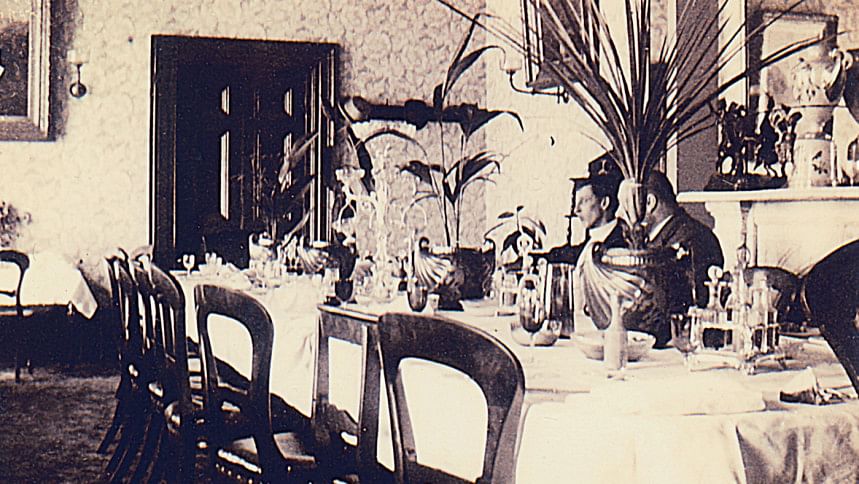Dining at Oxbridge: “Formal”, please

I was a little anxious. It was only the second day of my life at the University of Cambridge, and I was already bombarded with instructions on how to dine. It was a cool October evening, yet I was sweating nervously and profusely in the black suit I brought from Dhaka, topped now with a dinner gown, a mandatory custom for dining at Oxbridge (Oxford and Cambridge together; often to refer to their academic credentials).
"Formal Hall" has a specific meaning for the Oxbridge student. Essentially it is a fancy, smartly attired meal that happens, at least once a week, in a college's main dining hall. For Oxbridge, a college is where students live, eat, and socialise (while departments serve the bulk of the academic duties). A formal hall, however, is much more than just dining; it is somewhat a "ritual" with an overarching sense of a grandeur and extravaganza, as Sharpe (1974) described—"the waiters scurried to and fro, bowed down by the weight of the food and their sense of occasion … the clatter of knives and forks, the clink of glasses, the rustle of napkins", which to Durkheim were "sacred objects" (1912/1995).
Awe and wonder were my initial reactions, too, when I arrived at the pre-dinner drinks, gazing at the mediaeval and magnificent wood-panelled hall, buzzing with hundreds of students and academics, and waistcoated servers waiting with trays of drinks of all kinds. I was seduced by the spectacle, forgot about being nervous and wanted to participate, and then to conform almost powerlessly and become a part of the eager ambiance. For the main dinner, I observed, students sat at long refectory tables and the Master (the chief of the college) and Fellows (senior academics) sat on a raised platform—known as the High Table. The main dinner began when the Butler (the dining hall manager) sounded a gong (a large metal disc) and we all stood in silence, and a dinner 'mantra' was read in Latin by the Master. I had no idea what it meant but once it was over, the meal began. The 'normal' formals comprise three courses and coffee, but special occasions, such as the Harry Potter themed formals or the ones to celebrate Burns Night (a celebration of the life and poetry of the poet Robert Burns) or even the nationally themed formals, invariably call for more opulence. Homerton College's Harry Potter Formals, known to students as "It's a bit like Hogwarts", is quite a show with their dining hall dressed up like Hogwarts' Great Hall, and staff attending as Professors Dumbledore, Snape, McGonagall, Umbridge, Voldemort, and Ginny Weasley while students cast as Harry, Ron, Hermione, and Draco.

What was the food like? Rich, copious, an epicurean heap, so to speak. A cursory glance at my formal hall invitation cards still reminds me of a host of pompous range of foods that I had consumed over the years. Churchill College (where I resided for my PhD) once served me buffalo mozzarella, watermelon, crouton and rocket salad Balsamic syrup followed by roulade of beef shin steak with stroganoff sauce, mustard crushed potatoes and seasonal greens, cauliflower risotto with chilli pangrattato, and raspberry crème brûlée and shortbread biscuits as dessert. At Homerton College (where I supervised undergraduates), I had classic prawn cocktail salad, gem lettuce, lemon and paprika, butternut squash and butter bean salad followed by roasted sea trout supreme with salsa verde, lentil, vegetable and herb filo pie, sautéed new potatoes, fine beans, mangetout and peas, and finally, lemon tart, whipped cream and raspberries as dessert. Thankfully, a much less 'bombastic' menu came up when the university Bangladesh society organised an Independence Day formal hall. It included the ever-familiar vegetable samosas, onion bhajis, pakoras and poppadoms as starters; tandoori chicken, beef bhuna, red lentil with spinach and sweet potato, ponir skewers and gulab Jamun and motichur laddu as desserts. However, 'deshi' or not, after every formal hall, I have always felt over-indulged, sluggish, fat.
Formal Hall is not just an eatery though.
Pretty soon, after a few 'formals', it dawned on me how dining subtly cultivates a habitus (how someone thinks and reacts to the world) for the Oxbridge student. S/he, by participating in the college dining and by engaging in sophisticated intellectual exchanges, feels at ease with people close to the establishment, both within academia and beyond. The Formal Hall thus demystifies the 'academic elite' to the Oxbridge student, manifesting why and how these two universities dominate prestigious career opportunities in the world. The micro dynamics of the dining rituals contribute to the "creation of a social drama" (Dacin et al., 2010) that makes participants feel "special", which has a powerful bearing on the formation of an individual identity that is uniquely Oxbridge—synonymous with academic excellence, prestige, and power.
True, the Oxbridge formal hall is an opulent affair, involving elaborate costumes and lavish dinner menu staged in a mediaeval ambiance. Agreed, Oxbridge dining rituals still legitimise 'elitism'–a hierarchy of roles and boundaries. At the same time, it is also true that Oxbridge dining is a coming together—a melting pot—of the old and the new, the seasoned and the promising, in an increasingly diverse global academia. Amidst the competitive climate of academic excellence at Oxbridge, students go through a transformative experience—both negative and positive; internally and externally. All via these festive feasts—also known as Formal Halls.
Manzoorul Abedin is an academic based in Cambridge, UK. He is currently an Associate Professor in Education and Interdisciplinary Studies at University of West London.

 For all latest news, follow The Daily Star's Google News channel.
For all latest news, follow The Daily Star's Google News channel. 








Comments